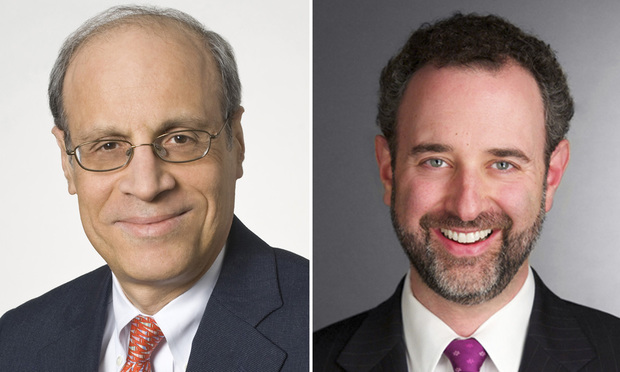Lewis R Clayton

July 13, 2015 | National Law Journal
Controversial Film Tests Limits of Copyright LawEn banc ruling in "Innocence of Muslims" case doesn't bode well for individual actors' claims.
By Lewis R. Clayton
5 minute read

July 13, 2015 | National Law Journal
Controversial Film Tests Limits of Copyright LawEn banc ruling in "Innocence of Muslims" case doesn't bode well for individual actors' claims.
By Lewis R. Clayton
5 minute read

July 08, 2015 | New York Law Journal
Supreme Court Patent Rulings; Copyright Law and Attorney FeesIn their Intellectual Property Litigation column, Lewis R. Clayton and Eric Alan Stone review the U.S. Supreme Court's rejection of a good-faith belief in the invalidity of a patent as a defense to induced infringement and its reaffirmation of a longstanding but widely discredited rule against post-patent-expiration royalties, along with recent Second and Ninth Circuit decisions.
By Lewis R. Clayton and Eric Alan Stone
12 minute read

July 08, 2015 | New York Law Journal
Supreme Court Patent Rulings; Copyright Law and Attorney FeesIn their Intellectual Property Litigation column, Lewis R. Clayton and Eric Alan Stone review the U.S. Supreme Court's rejection of a good-faith belief in the invalidity of a patent as a defense to induced infringement and its reaffirmation of a longstanding but widely discredited rule against post-patent-expiration royalties, along with recent Second and Ninth Circuit decisions.
By Lewis R. Clayton and Eric Alan Stone
12 minute read

May 12, 2015 | New York Law Journal
Fifty Percent Royalty Rate Affirmed Against Generic ManufacturerIn their Intellectual Property Litigation column, Lewis R. Clayton and Eric Alan Stone review the U.S. Supreme Court's recent decision on when a Trademark Trial and Appeal Board decision regarding likelihood of confusion can have issue-preclusive effect in an infringement lawsuit, along with appellate decisions regarding reasonable royalty rates and the "entire market value" rule in generic-pharmaceutical cases, application of the new test for patent indefiniteness, and more.
By Lewis R. Clayton and Eric Alan Stone
11 minute read

May 11, 2015 | New York Law Journal
Fifty Percent Royalty Rate Affirmed Against Generic ManufacturerIn their Intellectual Property Litigation column, Lewis R. Clayton and Eric Alan Stone review the U.S. Supreme Court's recent decision on when a Trademark Trial and Appeal Board decision regarding likelihood of confusion can have issue-preclusive effect in an infringement lawsuit, along with appellate decisions regarding reasonable royalty rates and the "entire market value" rule in generic-pharmaceutical cases, application of the new test for patent indefiniteness, and more.
By Lewis R. Clayton and Eric Alan Stone
11 minute read

March 30, 2015 | National Law Journal
Federal Circuit Must Heed Trial Court FindingsU.S. Supreme Court has determined that some patent law appeals aren't so special after all.
By Lewis R. Clayton
5 minute read

March 29, 2015 | National Law Journal
Federal Circuit Must Heed Trial Court FindingsU.S. Supreme Court has determined that some patent law appeals aren't so special after all.
By Lewis R. Clayton
5 minute read

March 09, 2015 | New York Law Journal
New Standard for Appellate Review of Claim ConstructionIn his Intellectual Property Litigation column, Lewis R. Clayton and Eric Alan Stone write: In the past two months, the Supreme Court handed down a significant patent-law decision establishing the standard of appellate review for claim-construction decisions, and resolved a circuit split by holding that a jury, not the court, should decide whether modifications to a trademark change the commercial impression of the mark.
By Lewis R. Clayton and Eric Alan Stone
12 minute read

March 08, 2015 | New York Law Journal
New Standard for Appellate Review of Claim ConstructionIn his Intellectual Property Litigation column, Lewis R. Clayton and Eric Alan Stone write: In the past two months, the Supreme Court handed down a significant patent-law decision establishing the standard of appellate review for claim-construction decisions, and resolved a circuit split by holding that a jury, not the court, should decide whether modifications to a trademark change the commercial impression of the mark.
By Lewis R. Clayton and Eric Alan Stone
12 minute read
Trending Stories
- 1Judge Denies Sean Combs Third Bail Bid, Citing Community Safety
- 2Republican FTC Commissioner: 'The Time for Rulemaking by the Biden-Harris FTC Is Over'
- 3NY Appellate Panel Cites Student's Disciplinary History While Sending Negligence Claim Against School District to Trial
- 4A Meta DIG and Its Nvidia Implications
- 5Deception or Coercion? California Supreme Court Grants Review in Jailhouse Confession Case
More from ALM
- Legal Speak at General Counsel Conference East 2024: Match Group's Katie Dugan & Herrick's Carol Goodman 1 minute read
- Legal Speak at General Counsel Conference East 2024: Eric Wall, Executive VP, Syllo 1 minute read
- Legal Speak at General Counsel Conference East 2024: Virginia Griffith, Director of Business Development at OutsideGC 1 minute read



